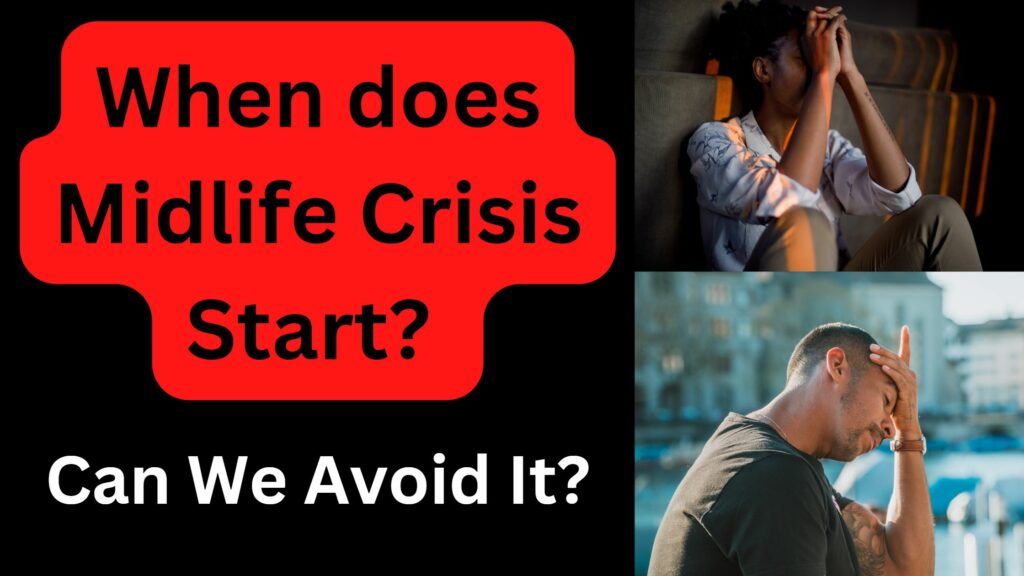When does Midlife Crisis Start? A midlife crisis is a period of transition that many people go through in their 40s or 50s. Feelings of uncertainty, anxiety and disillusionment characterize it. It often coincides with major life events, such as the onset of menopause in women or the beginning of andropause in men. During a midlife crisis, people may question their life choices and wonder whether they have made the right decisions. They may also feel a sense of loss or regret, and they may experience a desire to make drastic changes in their lives. Some people may try to turn back the clock by engaging in risky or reckless behaviour, such as having an affair or buying a sports car, while others may try to find new meaning or purpose in their lives by pursuing new hobbies or interests.
A midlife crisis can be complex but also an opportunity for growth and personal development. Many people emerge from a midlife crisis with a renewed sense of purpose and direction. They may make changes that allow them to live more authentically and by their values and priorities. They may also develop a deeper understanding of themselves and what is most important to them.
Symptoms of Midlife Crisis
Some common symptoms of a midlife crisis include:
Feelings of dissatisfaction or disillusionment with one's life: Some people may feel unhappy with their life's direction during a midlife crisis. They may feel like they have missed out on opportunities or made mistakes in the past. They may also start to feel like their life lacks meaning or purpose.
A sense of loss or regret about past choices: Some people may experience guilt or loss during a midlife crisis. They may feel like they made the wrong choices in the past, and now it is too late to change things. They may also feel like they have lost something valuable, such as their youth or opportunities for personal growth.
A desire to make drastic changes in one's life: Many people going through a midlife crisis may feel the urge to make significant changes. They may want to quit their job, end their relationships, or move to a new city. These changes can be exciting, but they can also be frightening and overwhelming.
Loss of interest in hobbies or activities that used to be enjoyable: Some people may find that they no longer enjoy the things they used to love. They may lose interest in hobbies, sports, or social activities that they used to find fulfilling. This can lead to feelings of boredom and isolation.
Increased anxiety or feelings of stress: A midlife crisis can be a stressful and anxious time. Some people may feel overwhelmed by their emotions and experience anxiety or panic attacks. They may also feel like they are under a lot of pressure to make changes in their lives.
Difficulty sleeping or changes in appetite: Some people may experience changes in their sleep patterns or eating habits during a midlife crisis. They may have trouble sleeping, or they may sleep more than usual. They may also lose or gain weight without trying.
A tendency to engage in risky or reckless behaviour: Some people may take more risks or act impulsively during a midlife crisis. They may start engaging in risky behaviours, such as excessive drinking, gambling, or reckless driving. These behaviours can be dangerous and can lead to negative consequences.
Feelings of loneliness or isolation: A midlife crisis can be a very isolating experience. Some people may feel like they are the only ones going through this challenging time and may feel lonely or disconnected from others. This can lead to feelings of depression or hopelessness.
These symptoms can vary from person to person, and not everyone who experiences a midlife crisis will have all of these symptoms. Some people may have only a few of these symptoms, while others may have many. It's also important to note that some of these symptoms can be caused by other factors, such as health problems or other life events, and may not necessarily indicate a midlife crisis. If you are experiencing any of these symptoms causing distress or interfering with your daily life, it may be helpful to speak with a mental health professional. They can help you determine the cause of your symptoms and provide support and guidance to help you through this difficult time.

Ways to Improve Mental Health
Engage in regular exercise: Exercise can help reduce stress, improve mood, and boost self-esteem. Aim for at least 30 minutes of moderate-intensity physical activity per day.
Eat a healthy, balanced diet: A healthy diet can improve your overall well-being and help reduce the risk of mental health conditions. Eat a variety of fruits, vegetables, whole grains, and lean proteins, and limit your intake of sugar, caffeine, and alcohol.
Get enough sleep: Sleep is essential for good mental health. Aim for 7-9 hours of sleep per night, and try to go to bed and wake up at the same time each day.
Practice mindfulness: Mindfulness is being present at the moment and paying attention to your thoughts and feelings without judgment. Try meditation, deep breathing, or journaling to help cultivate mindfulness.
Connect with others: Strong social connections are essential for good mental health. Make time with friends and family, and consider joining a support group or community organization to meet new people and form new connections.
Set goals and work towards them: Setting and achieving goals can give you a sense of accomplishment and improve your self-esteem. Start by setting small, achievable goals, and work your way up to bigger ones.
Take time for yourself: It's essential to make time for yourself and do things that bring you joy and relaxation. This can be as simple as taking a warm bath, reading a book, or listening to your favourite music.
Learn new skills: Learning new skills can challenge your mind and improve your cognitive function. Try taking a class, learning a new hobby, or picking up a new instrument to keep your mind active and engaged.
Reduce stress: Chronic stress can hurt your mental health. Try to reduce stress by practising relaxation techniques, setting boundaries, and managing your time effectively.
Cold showers: Some people believe that cold showers have several health benefits, including improved circulation, reduced muscle soreness, and improved mood. However, it is essential to note that cold showers may not be suitable for everyone and can be uncomfortable or even dangerous for some people. If you want cold showers, you should talk to your doctor first to ensure they are safe.
Seek professional help: If you are struggling with your mental health, don't hesitate to seek help from a mental health professional. They can provide support, guidance, and treatment to help you improve your mental well-being.
Advice for people 30 to 40 years old who've faltered - Jordan Peterson
When does Midlife Crisis Start? SUMMARY
Midlife crisis is a term used to describe the period of transition and uncertainty that many people experience as they age. It typically occurs in people's 40s or 50s and can be triggered by a wide range of factors, such as the realization that they are getting older, changes in their health or appearance, or a sense of dissatisfaction with their lives.
People may lose direction, purpose, or identity during a midlife crisis. They may feel like they have failed to achieve their goals or missed out on opportunities. They may feel anxious, depressed, or overwhelmed. They may also experience physical symptoms, such as changes in appetite or sleep patterns.
It's important to remember that a midlife crisis is a normal part of life, and many people go through it at some point. However, it cannot be easy, and people must seek support and find healthy ways to cope with their emotions. This may include talking to friends or family members, seeking counselling or therapy, or engaging in activities that provide a sense of meaning or fulfilment.
Conclusion
I am not a doctor, and everything above is for information purposes; please see a professional if you are struggling.
From my own experience, I can confirm. Midlife Crisis exist.
I will update you on my personal experience from time to time on this website and my social media.
Thank you for your time, and I hope you found this article helpful; if you have any questions about it, please leave a comment below or feel free to reach out to me on contact us! Page.
Have a great day!





I have just turned 50 and when Covid19 appeared and overwhelmed the world, I think that was the time that I fell into a midlife crisis and just wanted to stop what I was doing. So I looked and looked online to work from home, and thats when I found how to do affiliate marketing and it is now a succesful business by working on a blog and niche that I am passioned about. Sometimes a midlife crisis is a good thing haha!
It was probably around the time that Covid19 debuted and overwhelmed the world that I had a midlife crisis and decided to give up on life. Eventually, I did enough research online to learn about affiliate marketing, and now I run a thriving online business from the comfort of my own home. Affiliate marketing has been my new source of income, and I couldn’t be happier. Because I have lots of freedom. Exceptional article, thank you very much.
I think midlife crisis period can be change in different culture. Feelings of uncertainty, anxiety and disillusionment characterize can be easily be affected by your atmosphere the point is how to tolerate with the complexity. As it was mentioned it can be an opportunity for growth. i enjoyed reading it and i think every one has to read this content because we live once and we will definitely experience midlife crisis. thank you for sharing my friend.
Thanks for this great article about mid life crisis. Lots of information to learn more. I do believe mid life crisi is real from a personal experience, and i like the way you added a positive side to it saying it can be an opportunity for growth and personal development. This really appealed to me to look at it from a different angle.
I also appreciate your photo at the end of this article, it always so much more credible and honest when the author shows himself/herself. Thankyou!
One thing is for sure if we live long enough we will all get old one day, it is a part of the life cycle of humans. And as mentioned there are so many people that go through a tough time during this part of their lives but the good news is with the advice you have given can help so many people feel good about themselves again. Thanks so much for an amazing post.
Midlife can be a real problem.
The awareness is presented well in this post along with practical solutions.
That really will help people think and act wisely.
I wish I could have learned this early in my life.
The spirit we live in as humans in the early stages of our adult life does not extend unfortunately to mid-40 and up.
But preparing the mind to take this challenge and think about the life voyage can be less surprising and more fruitful.
Your situation, mental health, and relationship management need updated knowledge to tackle the upcoming challenges.
A continual growth mindset and learning better and healthier life skills tremendously help.
In this connection, the Wealthy Affiliate platform offers an incredible opportunity for many wondering what to do.
We here a lot about people having a mid life crisis. Sometimes it is in jest. Many times it occurs when there are some major life changes, like the kids leaving home. Having friends to talk things over with and getting reassurance, helps many get through it. It is much more difficult when you feel isolated and alone. Having a website can help you feel like you have someone to chat with. So that can be a help as well.
Hey Vlad, your site is highly informative. I recognize some of the symptoms felt in midlife. It is something we all share, and I like the way you have organized your content. It is informative and easy to navigate. I think you will have a lot of visitors in the future. Best wishes, Chet
Hey thanks for this post!
Dreading the midlife crisis according to some individuals who meet every now and then, it seems like a real stress! How generous of you to not only state what it is and its symptoms but also ways to try and help ease the problem! This post is definitely worth bookmarking as well as taking note of!
Thanks again and have a great day!
Such a unique article written, very well done.
It can be a challenging time, but if you take the time to understand your feelings, be kind to yourself and seek out support, it can be an opportunity for growth and personal development. These are the keys to understanding midlife crisis in my opinion.